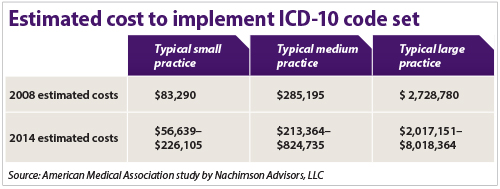New estimates of costs to implement the federally mandated ICD-10 code set by Oct. 1 are in some cases nearly three times more than previously estimated, according to a new AMA study.
Costs associated with ICD-10 implementation include training, vendor and software upgrades, testing and payment disruption. Compared to a similar study completed in 2008, these costs could be as much as $8 million for a typical large physician practice. For a small practice, implementation costs could be more than $225,000. The move is expected to be “much more disruptive for physicians” than previous mandates.
“The markedly higher implementation costs for ICD-10 place a crushing burden on physicians, straining vital resources needed to invest in new health care delivery models and well-developed technology that promotes care coordination with real value to patients,” AMA President Ardis Dee Hoven, MD, said in a news release.
“Continuing to compel physicians to adopt this new coding structure threatens to disrupt innovations by diverting resources away from areas that are expected to help lower costs and improve the quality of care,” Dr. Hoven said.
Current cost estimates are higher now “due to the need for testing, and the potential for increased payment disruption,” the study reports. “A major element in cost is clearly the vendor/software upgrade category.”
The study notes specialty practices will see the highest ICD-10 implementation costs, especially in productivity losses and payment disruptions, because of their higher revenues and per hour rates.
The study estimates both pre- and post-ICD-10 implementation costs for average small, medium and large physician practices. While conservative cost estimates fall slightly below 2008 estimates, the range of expenses is much higher than the AMA’s 2008 analysis, and many practices are expected to fall into the higher ranges.
“Because of variability in the size and specialty of practices, there is no ‘one size fits all’ implementation process for practices to follow,” the study said.
The AMA has been able to keep ICD-10 at bay for more than a decade and continues to urge lawmakers to stop implementation of the code set. Physicians can ask their members of Congress to co-sponsor legislation to stop ICD-10 implementation, known as the Cutting Costly Codes Act of 2013, by sending an email through the AMA’s Physician Grassroots Network.
As the AMA works to halt ICD-10, physicians should continue to prepare for the new code set. Access free educational resources from the AMA for practical insight into the preparation process, or visit the AMA Store for additional training opportunities and products.
These numbers are too important to ignore. Share on social media, and help us #StopICD10.




